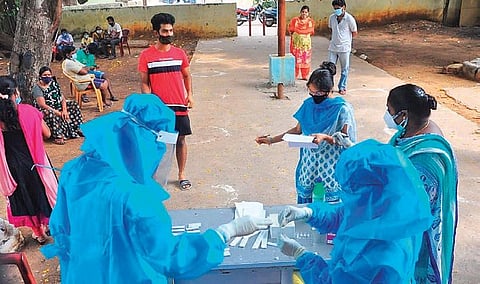

BENGALURU: Covid-19 patients had to endure various indignities, including denial of essential healthcare services, being forced to pay inflated bills in private hospitals, and refused admission for emergency services without a Covid-19 test, found two rapid surveys by Oxfam India during the pandemic in the country.
Additionally, marginalised communities like Dalits, Adivasis and religious minorities like Muslims faced new forms of violence, and discrimination in both public and private hospitals. While the Covid-19 vaccine is seen as a solution to the pandemic, its rollout has also been rife with inequalities, said the report titled ‘Securing Rights of Patients in India’.
“Over a third of women (35 per cent) said they had to undergo physical examination by a male practitioner, without another female present in the room. Studies have shown that women were more likely to go for gynaecological examinations when norms and standards related to privacy are maintained,” the survey stated.
A third of Muslim respondents and over 20 per cent of Dalit and Adivasi respondents reported feeling discriminated against on grounds of their religion or caste in hospital by healthcare professionals.
Oxfam stated that failure to provide detailed cost of treatment was fairly uniform across the board for rural (58%) and urban (59%) areas, and irrespective of family income, although the rates were somewhat higher for those who were poorer, and more.
CHALLENGES IN VAX DISTRIBUTION
Challenges faced in Covid-19 vaccination were fairly similar, irrespective of the socio-economic profile of respondents, or site of vaccination. These included the need to make multiple visits to vaccination centres, economic consequences of doing so (either loss of wages or high cost of vaccination) and the need to travel long distances to obtain the vaccine, Oxfam said.
22% ST, 21% SC
Patients said they were discriminated against by healthcare providers or in hospitals due to tribal identity/caste
STARK COVID ANOMALIES
15% of OBC patients said they felt discriminated against because of caste
58% of those hospitalised, or had relatives hospitalised, said they were not provided with estimated cost of treatment or procedure before starting
31% denied case papers, other documents even after requests